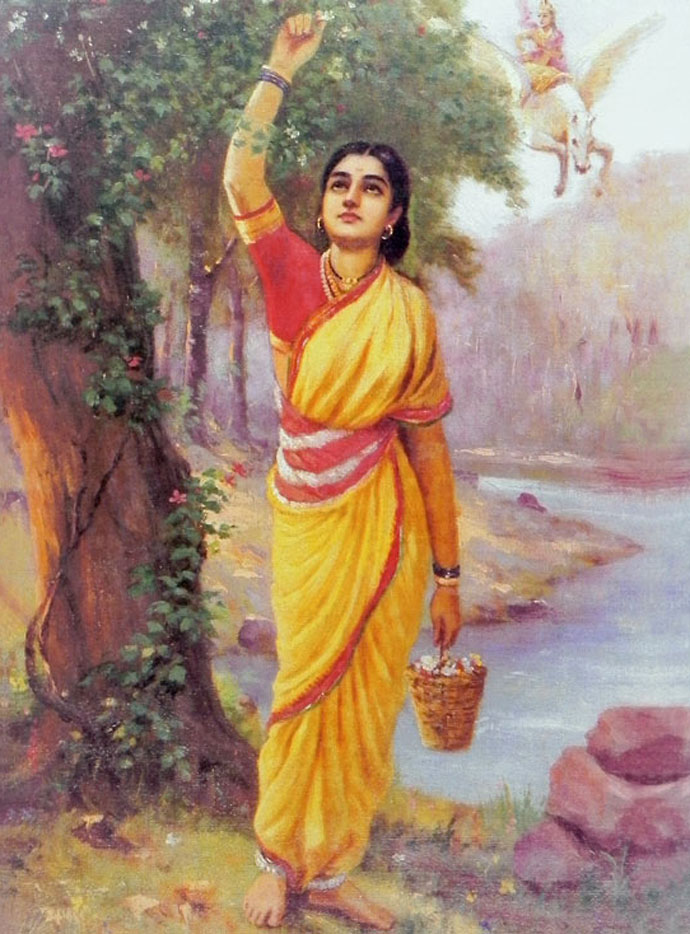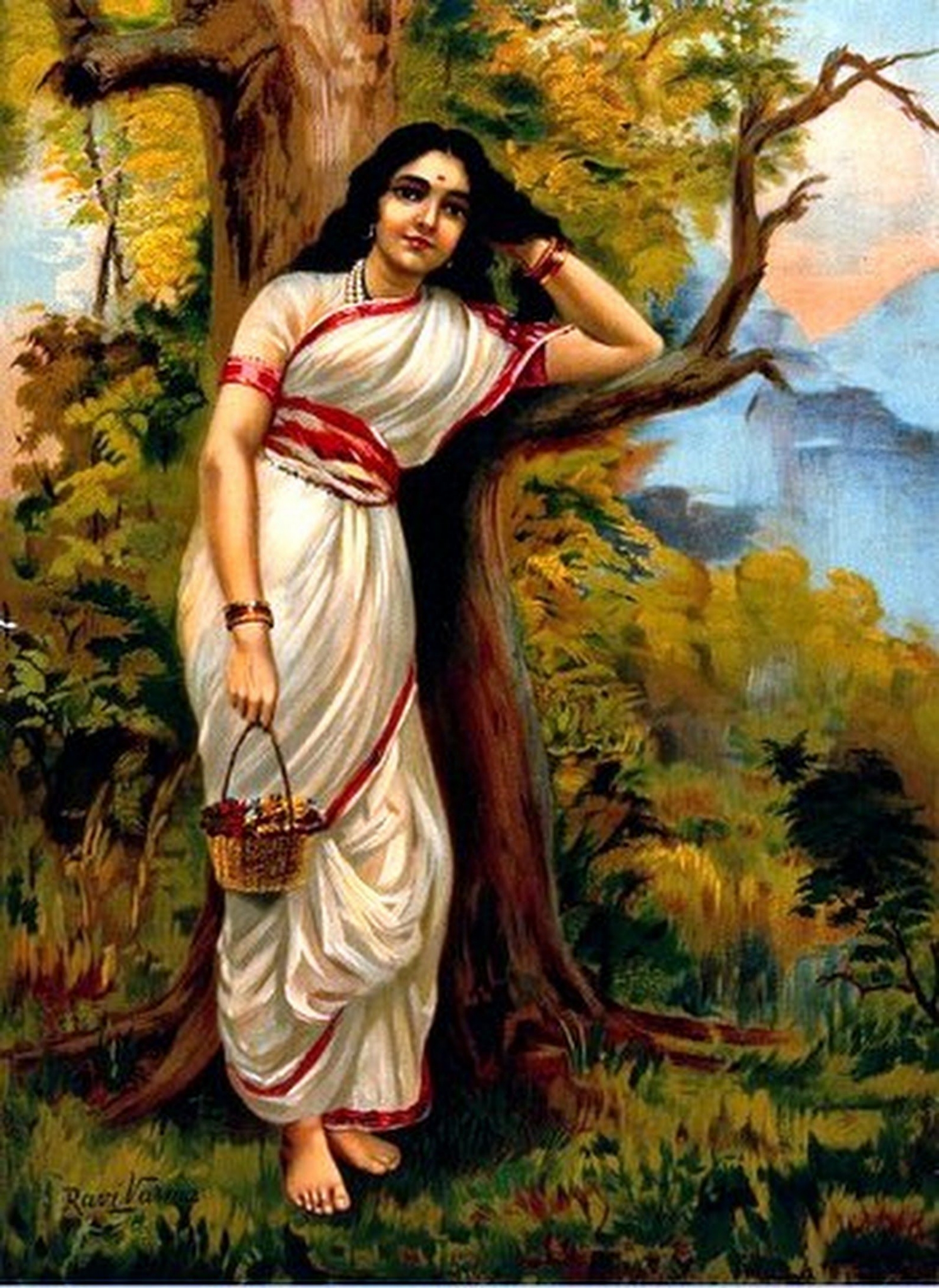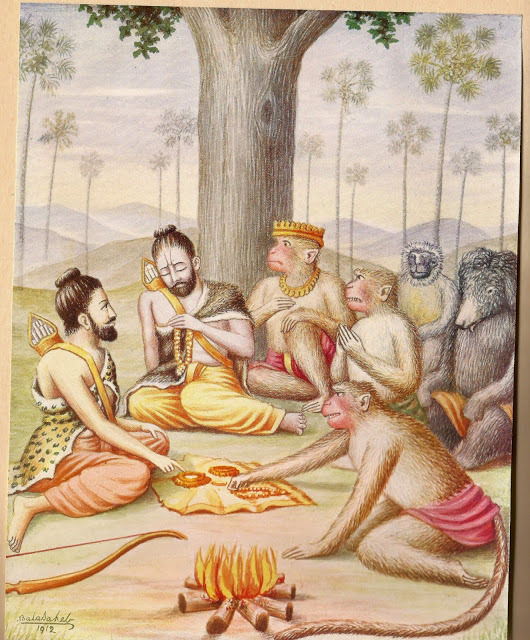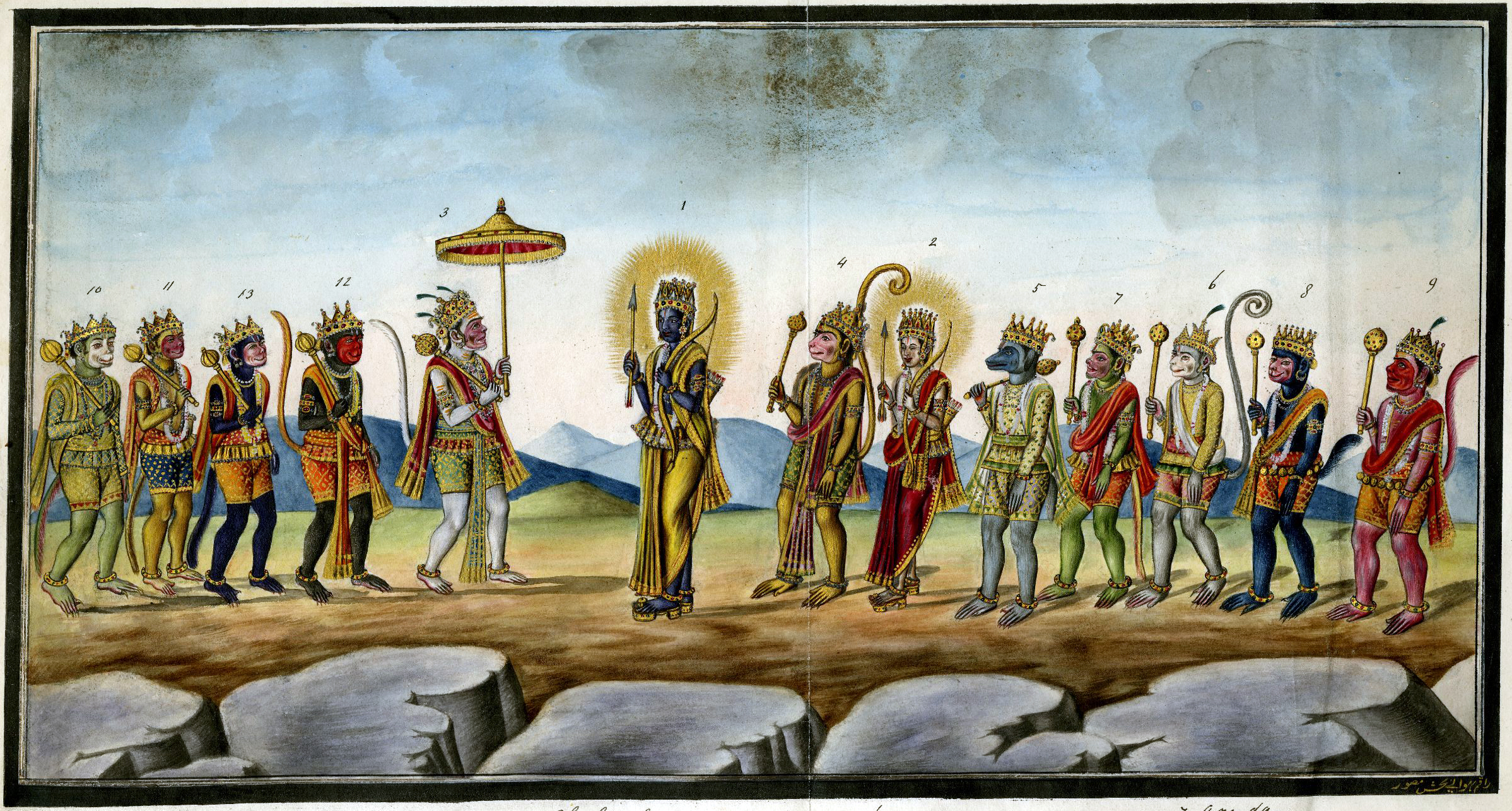|
Panchakanya
''Panchakanya'' ( sa, पञ्चकन्या, IAST:, ) is a group of five iconic women of the Hindu epics, extolled in a hymn and whose names are believed to dispel sin when recited. They are Ahalya, Draupadi, Kunti, Tara, and Mandodari. While Draupadi and Kunti are from Mahabharata,Chattopadhyaya pp. 13–4 Ahalya, Tara and Mandodari are from the epic Ramayana. The panchakanya are venerated as ideal women and chaste wives in one view. Their association with more than one man except Draupadi and breaking of traditions in some cases are prescribed as not to be followed by others. Hymn The well-known Sanskrit hymn that defines the Panchakanys runs: ''Sanskrit transliteration'' English translation Ahalya, Draupadi, Sita, Tara and Mandodari One should forever remember the panchakanya who are the destroyers of great sins A variant replaces Sita with Kunti: ''Sanskrit transliteration'' Differences are underlined. Practising Hindus, especially Hindu wives, remember ... [...More Info...] [...Related Items...] OR: [Wikipedia] [Google] [Baidu] |
Ahalya
In Hinduism, Ahalyā ( sa, अहल्या, IAST: Ahalyā) also known as Ahilya, is the wife of the sage Gautama Maharishi. Many Hindu scriptures say that she was seduced by Indra (the king of gods), cursed by her husband for infidelity, and liberated from the curse by Rama (7th avatar of the god Vishnu). Created by the god Brahma as the most beautiful woman, Ahalyā was married to the much older Gautama. In the earliest full narrative, when Indra comes disguised as her husband, Ahalyā sees through his disguise but nevertheless accepts his advances. Later sources often absolve her of all guilt, describing how she falls prey to Indra's trickery. In all narratives, Ahalyā and Indra are cursed by Gautama. The curse varies from text to text, but almost all versions describe Rāma as the eventual agent of her liberation and redemption. Although early texts describe how Ahalyā must atone by undergoing severe penance while remaining invisible to the world and how she is pu ... [...More Info...] [...Related Items...] OR: [Wikipedia] [Google] [Baidu] |
Panchakanya
''Panchakanya'' ( sa, पञ्चकन्या, IAST:, ) is a group of five iconic women of the Hindu epics, extolled in a hymn and whose names are believed to dispel sin when recited. They are Ahalya, Draupadi, Kunti, Tara, and Mandodari. While Draupadi and Kunti are from Mahabharata,Chattopadhyaya pp. 13–4 Ahalya, Tara and Mandodari are from the epic Ramayana. The panchakanya are venerated as ideal women and chaste wives in one view. Their association with more than one man except Draupadi and breaking of traditions in some cases are prescribed as not to be followed by others. Hymn The well-known Sanskrit hymn that defines the Panchakanys runs: ''Sanskrit transliteration'' English translation Ahalya, Draupadi, Sita, Tara and Mandodari One should forever remember the panchakanya who are the destroyers of great sins A variant replaces Sita with Kunti: ''Sanskrit transliteration'' Differences are underlined. Practising Hindus, especially Hindu wives, remember ... [...More Info...] [...Related Items...] OR: [Wikipedia] [Google] [Baidu] |
Tara (Ramayana)
In the Hindu epic ''Ramayana'', Tara ( sa, तारा, , literally "star";) is the Queen of Kishkindha and wife of the monkey (vanara) King Vali. After being widowed, she becomes the Queen of Sugriva, Vali's younger brother. Tara is described as the daughter of the monkey physician Sushena in the ''Ramayana'', and in later sources, as an ''apsara'' (celestial nymph) who rises from the churning of the milky ocean. She marries Vali and bears him a son named Angada. After Vali is presumed dead in a battle with a demon, his brother Sugriva becomes king and appropriates Tara; however, Vali returns and regains Tara and exiles his brother, accusing him of treachery. When Sugriva challenges Vali to a duel, Tara wisely advises Vali not to accept because of the former's alliance with Rama—the hero of the ''Ramayana'' and an avatar of the god Vishnu—but Vali does not heed her, and dies from Rama's arrow, shot at the behest of Sugriva. The ''Ramayana'' and its later adaptations emp ... [...More Info...] [...Related Items...] OR: [Wikipedia] [Google] [Baidu] |
Draupadi
Draupadi ( sa, द्रौपदी, draupadī, Daughter of Drupada), also referred to as Krishnaa, Panchali, and Yagyaseni, is the main female protagonist of the Hindu epic ''Mahabharata,'' and the common consort of the five Pandava brothers—Yudhishthira, Bhima, Arjuna, Nakula, and Sahadeva. She is noted for her beauty, courage, and a rare Polyandry, polyandrous marriage. In Mahabharata, Draupadi and her brother, Dhrishtadyumna, were born from a ''yajna'' (fire sacrifice) organized by King Drupada of Panchala. Arjuna won her hand in marriage, but she had to marry the five brothers because of her Kunti, mother-in-law's misunderstanding. Later, she became an empress, as Yudhishthira performed the Rajasuya ritual and achieved the status of the emperor. She had five sons, one from each Pandava, who were collectively addressed as the Upapandavas. The most notable incident in Draupadi's life is the game of dice at Hastinapur, Hastinapura where Yudhishthira loses his possessio ... [...More Info...] [...Related Items...] OR: [Wikipedia] [Google] [Baidu] |
Mandodari
Mandodari ( sa, मंदोदरी, , lit. "soft-bellied";) was the queen consort of Ravana, the king of Lanka, according to the Hindu epic ''Ramayana''. The ''Ramayana'' describes Mandodari as beautiful, pious, and righteous. She is extolled as one of the ''Panchakanya'', the recital of whose names is believed to dispel sin. Mandodari was the daughter of Mayasura, the King of the Asuras (demons), and the '' apsara'' (celestial nymphs) Hema. Mandodari bears three sons: Meghanada ( Indrajit), Atikaya, and Akshayakumara. According to some Ramayana adaptations, Mandodari is also the mother of Rama's wife Sita, who is infamously kidnapped by Ravana. Despite her husband's faults, Mandodari loves him and advises him to follow the path of righteousness. Mandodari repeatedly advises Ravana to return Sita to Rama, but her advice falls on deaf ears. Her love and loyalty to Ravana are praised in the ''Ramayana''. In a version of Ramayana, Hanuman tricks her into disclosing the locatio ... [...More Info...] [...Related Items...] OR: [Wikipedia] [Google] [Baidu] |
Kunti
Kunti ( sa, कुन्ती, ), named at birth as Pritha ( sa, पृथा, ), is one of the prominent characters of the Hindu epic ''Mahabharata''. She is best known as the mother of the Pandavas and Karna, the main protagonists of the epic. She is described to be beautiful, intelligent, and shrewd. Born to the Yadava chief Shurasena, Pritha was adopted by her childless uncle, Kuntibhoja, and was renamed Kunti. During her teenage years, she impressed sage Durvasa and was blessed with the knowledge of a divine ''mantra''. Out of curiosity, she used the mantra to invoke the sun god Surya, and was blessed with a son named Karna. As he had been born out of wedlock, Kunti had to abandon him to save herself from dishonor. After reaching adulthood, she chose Pandu, the king of Kuru, as her husband, but her married life was disturbed when Madri, princess of Madra, became Pandu's second wife. One day, Pandu was cursed that he would perish instantly if he tried to touch any of his ... [...More Info...] [...Related Items...] OR: [Wikipedia] [Google] [Baidu] |
Sugriva
''This character is about the vanara, in the Ramayana.'' Sugriva ( sa, सुग्रीव, , ) is a character In the ancient Indian epic Ramayana. He is the younger brother of Vali, whom he succeeded as ruler of the vanara kingdom of Kishkindha. Rumā is his wife. He is a son of Surya, the Hindu deity of the sun. As the king of the vanaras, Sugriva aided Rama in his quest to liberate his wife Sita from captivity at the hands of the rakshasa king Ravana. Nomenclature He is also known as jv, Sugriwa, th, Su-khrip, lo, Sugeep, km, Sukhreeb, Creole: ''Soogrim'', lo, Sangkip, ta, Cukkirivan, my, Thugyeik, Sugreeva or Sugreev. Legend The story of Sugriva is part of Ramayana and in an abbreviated version, is also present in the Mahabharata. The king of Kishkindha, Vrikshraja, was a divine creature born from Brahma’s tilaka. He had the body of a human and face and tail of a monkey. He was instructed to roam the forests and kill demons. One day, Vriksharaja entered a ... [...More Info...] [...Related Items...] OR: [Wikipedia] [Google] [Baidu] |
Episode From Kishkinda Kanda
An episode is a narrative unit within a larger dramatic work or documentary production, such as a series intended for radio, television or streaming consumption. The noun ''episode'' is derived from the Greek term ''epeisodion'' (), meaning the material contained between two songs or odes in a Greek tragedy. It is abbreviated as '' ep'' (''plural'' eps). An episode is also a narrative unit within a ''continuous'' larger dramatic work. It is frequently used to describe units of television or radio series that are broadcast separately in order to form one longer series. An episode is to a sequence as a chapter is to a book. Modern series episodes typically last 20 to 50 minutes in length. The noun ''episode'' can also refer to a part of a subject, such as an “episode of life” or an “episode of drama”. See also * List of most-watched television episodes This page lists the television broadcasts which had the most viewers within individual countries, as measured b ... [...More Info...] [...Related Items...] OR: [Wikipedia] [Google] [Baidu] |
Kishkindha
Kishkindha (, ) is a kingdom of the vanaras in Hinduism. It is ruled by King Sugriva, the younger brother of Vali, in the Sanskrit epic ''Ramayana''. According to the Hindu epic, this was the kingdom that Sugriva ruled with the assistance of his counsellor, Hanuman. During the Treta Yuga, the whole region was within the dense Dandaka Forest which was founded by King Danda, son of Ikshvaku, and descendant of Vaivasvata Manu in the Satya Yuga, which extended from the Vindhya range to the South Indian peninsula. Thus, this kingdom was considered that of the vanaras. During the Dvapara Yuga, the Pandava Sahadeva is stated to have visited this kingdom in the epic ''Mahabharata'' during his southern military campaign to collect tribute for Yudhishthira's Rajasuya sacrifice. Literature Ramayana The Ramayana has a book that is based in Kishkindha, known as the Kishkinda Kanda. In this text, a banished Sugriva sends his trusted counsellor, Hanuman, to meet the mysterious Rama and L ... [...More Info...] [...Related Items...] OR: [Wikipedia] [Google] [Baidu] |
Vanara
In Hindu, Vanara ( sa, वानर, , forest-dwellers) are either monkeys, apes, or a race of forest-dwelling people. In the epic the ''Ramayana'', the Vanaras help Rama defeat Ravana. They are generally depicted as humanoid apes, or human-like beings. Etymology There are three main theories about the etymology of the word "Vanara": * Aiyanar suggests that ''vanara'' means "monkey" derived from the word ''vana'' ("forest"), Literally meaning "belonging to the forest" Monier-Williams says it is probably derived from ''vanar'' (lit. "wandering in the forest") and means "forest-animal" or monkey. * Devdutt Pattanaik suggests that it derives from the words ''vana'' ("forest"), and ''nara'' ("man"), thus meaning "forest man" and suggests that they may not be monkeys, which is the general meaning. * It may be derived from the words ''vav'' and ''nara'', meaning "is it a man?" (meaning "monkey") or "perhaps he is man". Identification Although the word Vanara has come to mean ... [...More Info...] [...Related Items...] OR: [Wikipedia] [Google] [Baidu] |
Vali (Ramayana)
Vali ( sa, वाली, nominative singular of the stem वालिन् (''Valin'')), also known as Bali, was a king of Kishkindha in the Hindu epic Ramayana. He was the husband of Tara, the biological son of Vriksharaja, the elder brother of Sugriva, and father of Angada. He was killed by Rama, an ''avatar'' of Vishnu. Vali was invincible during the''Treta Yuga''. Vali defeated some great warriors, only because he was blessed with the ability to obtain half the strength of his opponent. Rama killed Vali by shooting him in the chest. However, during his first attempt, Rama could not recognise between Vali and Sugriva due to their resemblance. Thus, during the next attempt, Sugriva wore a garland of red flowers and went to battle with Vali. This time, Rama could recognise Vali and shot an arrow that killed him. Early life Vali was the husband of Tara. As one myth goes, fourteen types of gem or treasure were produced from the churning of the ocean during the time of Kurma ... [...More Info...] [...Related Items...] OR: [Wikipedia] [Google] [Baidu] |
Angada
Angada (Sanskrit: अङ्गदः, IAST: Aṅgada) is a legendary vanara in Hinduism. He helps Rama find his wife Sita and fight her abductor, Ravana, in the epic Ramayana. He is the prince of Kishkindha, and is later crowned as the kingdom's monarch. Legend Angada is a son of the powerful vanara king Vali, and his wife Tara. He is the nephew of Sugriva. After Rama and Sugriva kill his father, Angada joins Rama's forces to rescue Sita from Ravana's captivity. Angada and Tara are instrumental in reconciling Rama and his brother, Lakshmana, with Sugriva, after the king fails to fulfill his promise to help Rama find and rescue his wife. Together, they are able to convince Sugriva to honour his pledge to Rama, instead of spending his time carousing and drinking. Sugriva then arranges for ''vanaras'' to help Rama and organises the monkey army that will battle Ravana's demonic host. Angada leads the particular search party, which consists of Hanuman and Jambavanta and i ... [...More Info...] [...Related Items...] OR: [Wikipedia] [Google] [Baidu] |



.jpg)

.jpg)





